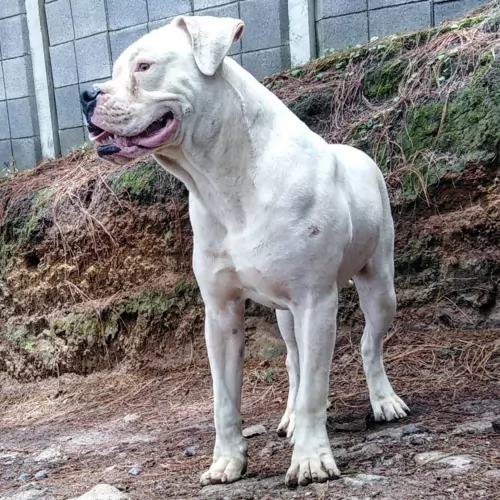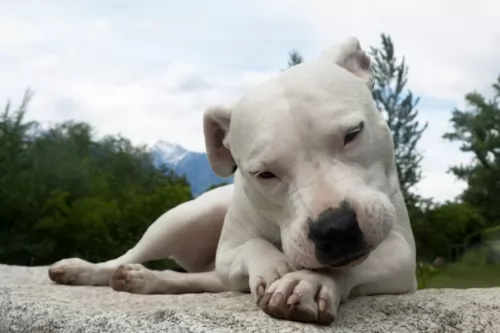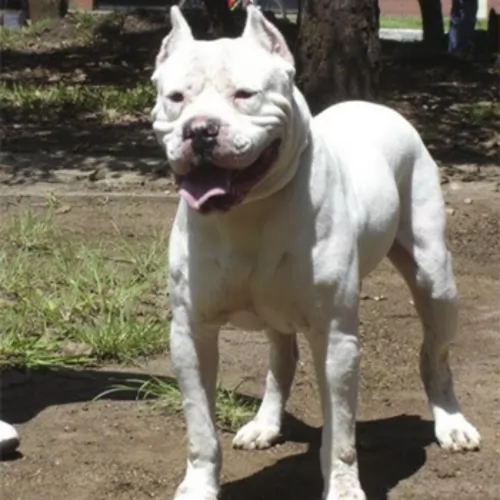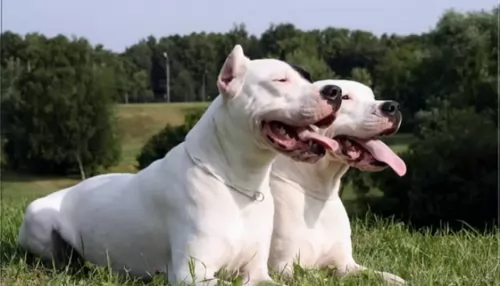 Petzlover
Petzlover Dogo Guatemalteco is originated from Guatemala but Welsh Corgi is originated from United Kingdom. Dogo Guatemalteco may grow 30 cm / 12 inches higher than Welsh Corgi. Dogo Guatemalteco may weigh 30 kg / 67 pounds more than Welsh Corgi. Dogo Guatemalteco may live 4 years less than Welsh Corgi. Both Dogo Guatemalteco and Welsh Corgi has same litter size. Dogo Guatemalteco requires Moderate Maintenance. But Welsh Corgi requires High Maintenance
Dogo Guatemalteco is originated from Guatemala but Welsh Corgi is originated from United Kingdom. Dogo Guatemalteco may grow 30 cm / 12 inches higher than Welsh Corgi. Dogo Guatemalteco may weigh 30 kg / 67 pounds more than Welsh Corgi. Dogo Guatemalteco may live 4 years less than Welsh Corgi. Both Dogo Guatemalteco and Welsh Corgi has same litter size. Dogo Guatemalteco requires Moderate Maintenance. But Welsh Corgi requires High Maintenance
 Known as the Guatemalteco Bull Terrier or Guatemalan Molosser, the Dogo Guatemalteco is also known as the Bull Terrier Guatemalteco, Guatemalan Bull Terrier, and Guatemalan Molosser.
Known as the Guatemalteco Bull Terrier or Guatemalan Molosser, the Dogo Guatemalteco is also known as the Bull Terrier Guatemalteco, Guatemalan Bull Terrier, and Guatemalan Molosser.
This big Molosser-type dog originates in Guatemala. In the 20th century, it was known as the Bullterrier Guatemalteco, but at the end of the century, it was changed to Dogo Guatemalteco.
Today, while the dog is kept as a companion dog, most are working guard dogs. The Dogo Guatemalteco isn’t recognized by any major international kennel clubs. However, the Kennel Club of Guatemala has given full recognition to this dog and it was in 1981 that the Guatemalan government named the dog as their national dog breed.
 The Pembroke Welsh Corgi and the Cardigan Welsh Corgi were once considered to be two types of the same breed. Today they are recognized as very different breeds, but cousins of sorts.. They are alike in many ways and very different in others. The general information in terms of height and weight above applies to the more popular and better known Pembroke Welsh Corgi, developed as a herding dog from the spitz line in Pembroke shire, Wales. The Pembroke is famous for being the breed favored since childhood by Queen Elizabeth, the current queen of England. It’s believed that the Pembroke came to the country around the 10th century with Flemish weavers. The Cardigan is thought to have come with the Norse people and be a relative of the Sedish Vallhund.
The Pembroke Welsh Corgi and the Cardigan Welsh Corgi were once considered to be two types of the same breed. Today they are recognized as very different breeds, but cousins of sorts.. They are alike in many ways and very different in others. The general information in terms of height and weight above applies to the more popular and better known Pembroke Welsh Corgi, developed as a herding dog from the spitz line in Pembroke shire, Wales. The Pembroke is famous for being the breed favored since childhood by Queen Elizabeth, the current queen of England. It’s believed that the Pembroke came to the country around the 10th century with Flemish weavers. The Cardigan is thought to have come with the Norse people and be a relative of the Sedish Vallhund.
The Cardigan Welsh Corgi, also a herding dog has their ancestry in ancient Celtic dogs. They are older than the Pembroke and hail from Cardiganshire, Wales.
Both breeds are friendly, smart and independent. Both dogs herd cattle and sheep. About the end of the 19th century, farmers in Cardiganshire began to raising sheep rather than cattle. The corgis were herding dogs for cattle. “Heelers” who avoid the cattle kicking them by nipping at the cattle’s heel. Pembrokeshore and Cardiganshire are counties in South West Wales that adjoin each other.
Then the move was made from cattle to sheep in Cardiganshire they bred their corgis with the Welsh Sheepdog where the merle color is said to come from, and the Pembroke Welsh Corgi. This caused the similarities between the two dwarf breeds. At the same time the distance grew between the two breeds and they grew into very distinct and different looking dogs. There are also some differences in their personalities.
The first corgi to appear at Crufts came in 1927 and in 1928 a Pembroke won a championship at Cardiff for the first ever corgi win. It was not until 1934 that the kennel club recognized them as separate breeds rather than a Pembroke shire type and a Cardiganshire type. From this point on the two are separate breeds with tremendous similarities. A Pem won the Reserve Best in Show at Crufts in 1955.
The first corgi came to the United States in 1933 by a breeder of Old English Sheepdogs. In 1934 the American Kennel Club (AKC) recognized Corgis as one breed with 2 types. The Pembroke has always been the more popular of the two.
 The Guatemalteco is a medium to large dog standing at 54 – 60cm and weighing between 40-45kg. He has a short, smooth coat and is essentially white with some black markings on the head.
The Guatemalteco is a medium to large dog standing at 54 – 60cm and weighing between 40-45kg. He has a short, smooth coat and is essentially white with some black markings on the head.
This breed was created from a crossing between a bull terrier, boxer and dalmatian. Some of the dogs are thickly built, while others are more leaner and athletic looking.
The ears of the dog vary quite a bit because while sometimes the ears fold down closely to the head, others are semi-pricked. There are some dog owners who have their dogs ears cropped into fully erect triangular shapes. The eye are small and usually dark brown.
The Dogo Guatemalteco is a fearless, evenly tempered dog. He was bred as a guard dog and he wants to protect his human family, forming a deep bond with them. It makes them difficult to re-home because of this.
It is imperative to have this dog trained and socialized because it might believe its the leader of the pack in your home. He is quite capable of getting along well with children and pets in the home. Because of his dominant nature, he isn’t suited as a pet for the first-time dog owner. He also doesn’t warm easily to strangers.
 They used to differentiate between the Cardigan and the Pembroke by saying the Cardigan was the one with the bigger ears and the Pembroke had no tail. In many parts of the world where tail docking has been banned, most Pembrokes now have tails. Only those born without don’t have them. Both dogs are long and low to the ground with big chests and short legs. This is because they are dwarfs. They are not little dogs.
They used to differentiate between the Cardigan and the Pembroke by saying the Cardigan was the one with the bigger ears and the Pembroke had no tail. In many parts of the world where tail docking has been banned, most Pembrokes now have tails. Only those born without don’t have them. Both dogs are long and low to the ground with big chests and short legs. This is because they are dwarfs. They are not little dogs.
The Cardigan Welsh Corgi is heavier boned than the Pembroke, has large rounded ears and a flowing, fox like tail. The Cardigan comes in a variety of colors but never predominately white. He is double coated with a dense, harsh outer and a soft, short and thick undercoat.
Pembroke is smaller and longer than the Cardigan with pointed ears. They are intelligent, sturdy and strong with tremendous stamina. The tail is docked in the United States or the pups are bred not to have a tail. This was originally so that the cattle could not step on their tails and injure the dogs. The double coat on the Pembroke is short and weather resistant inner coat with a longer and rougher outercoat. He has the same deep dropped chest as the Cardigan. Both corgis shed voraciously.
 Your Dogo Guatemalteco is an intelligent dog breed, and because he is strong-willed and stubborn he might give you a hard time during training. It is possible though and it is important as the training will turn him into an obedient, relaxed dog, able to get on with all his family members, including pets.
Your Dogo Guatemalteco is an intelligent dog breed, and because he is strong-willed and stubborn he might give you a hard time during training. It is possible though and it is important as the training will turn him into an obedient, relaxed dog, able to get on with all his family members, including pets.
He is an energetic dog and will require walks and other forms of exercise each day.
This is certainly not the kind of dog that you buy to protect your property and provide little else for him except food and water. Frustration on the dog’s part can lead to destructive behavior and aggression.
 1Children friendliness For the most part they are good but can be grumpy and bossy. They are bossy personalities
1Children friendliness For the most part they are good but can be grumpy and bossy. They are bossy personalities
3.Adaptability – Very. Can live anywhere but they do need to run and they bark a lot.
4.Learning ability – incredibly smart but stubborn. Respond well to training that is reward based.
 This dog can be susceptible to skin allergies. The skin is sensitive and prone to rashes.
This dog can be susceptible to skin allergies. The skin is sensitive and prone to rashes.
Another health concern with this dog because of his white coat, is congenital deafness. The deafness could be in one- or both ears.
The dog could also experience lameness, of which the most common problem is hip dysplasia. Because skeletal problems occur in this breed, it is advisable for owners to have their pet tested by the Orthopedic Foundation for Animals.
 • Degenerative Myelopathy – a muscular neurological disease very similar to Lou Gehrig’s Disease or ALS. It is always fatal.
• Degenerative Myelopathy – a muscular neurological disease very similar to Lou Gehrig’s Disease or ALS. It is always fatal.
• Some have cardiac issues while others may have hip dysplasia or Von Willebrand’s disease.
 The coat of the dog is short and harsh and it sheds throughout the year. While he is still looked upon as a low maintenance dog, regular brushing will be required twice a week.
The coat of the dog is short and harsh and it sheds throughout the year. While he is still looked upon as a low maintenance dog, regular brushing will be required twice a week.
Because he is a dog breed that is susceptible to skin allergies, bathing isn't necessary as it removes the dog’s natural oils.
Other areas of grooming for this dog are brushing his teeth twice a week, trimming his nails and checking his ears.
Always choose a high quality dog food for your Dogo Guatemalteco and look at the feeding recommendations on the packaging.
When you feed your pet kibble, you can also mix in some cooked brown rice, vegetable and chicken for variety and contentment.
Raw meat is also advised from time to time. Don’t just go on and on through the years feeding your dog the same amount of food, as there are factors to take into account when deciding on food quantity. The age of your dog, it’s stage of life and its activity levels will mean regulating your pet’s food to match his needs.
 1Feeding the puppy prone to overweight, the pem needs ½ to 1 cup of small breed high quality food in 3-4 meals per day. The Cardigan needs ¾ to 1 ¼ cups of high quality small breed food in 3-4 meals per day.
1Feeding the puppy prone to overweight, the pem needs ½ to 1 cup of small breed high quality food in 3-4 meals per day. The Cardigan needs ¾ to 1 ¼ cups of high quality small breed food in 3-4 meals per day.
2.Feeding the adult – Don’t overfeed them. The Pem need 1 cup per day of high quality small breed food in 2 meals per day. The Cardigan needs 1-1 ½ cups per day in one to two meals.
They are fast, athletic dogs. Agility, CAT, Barnhunt. Herding trials, flyball and they just love backyard ball fetching. Confirmation and obedience, along with rally.